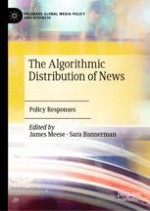2022 | OriginalPaper | Chapter
11. Diversity, Fake News and Hate Speech: The German Response to Algorithmic Regulation
Author : Kerstin Liesem
Published in: The Algorithmic Distribution of News
Publisher: Springer International Publishing
Activate our intelligent search to find suitable subject content or patents.
Select sections of text to find matching patents with Artificial Intelligence. powered by
Select sections of text to find additional relevant content using AI-assisted search. powered by
